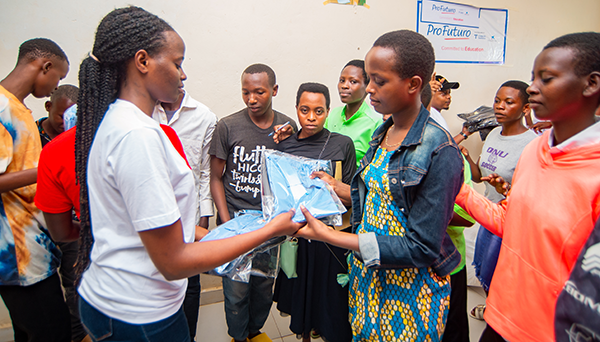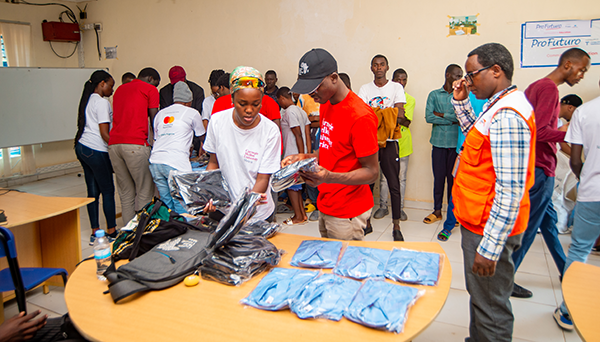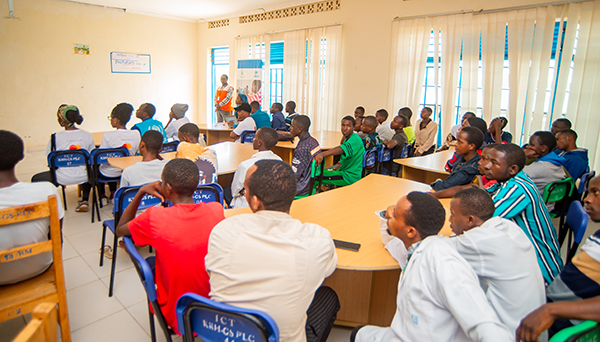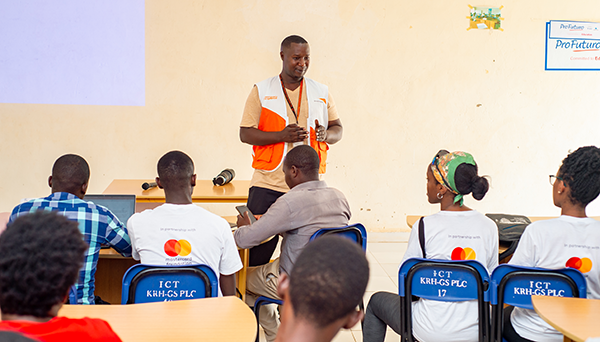Refugee outreach welcomes students to the ICT space
Faculty at Carnegie Mellon University Africa hosted workshops to give educators important classroom resources, while Mastercard Foundation Scholars visited secondary school students to build their programming and computer skills. The goal is to get students interested in ICT early on so they can ultimately pursue careers in the field.
Carnegie Mellon University Africa is taking a multifaceted approach to promoting inclusivity for refugees in educational spaces. The initiatives range from hosting workshops for high school ICT instructors, to collaborating with other universities to speak directly to young refugees to teach them about the many opportunities available in information and communications technology.
ICT is an expanding field—but a lack of educational resources and upskilling opportunities are among the many barriers to refugee students pursuing this career path.
“Inclusion is a central value of CMU-Africa,” says Nancy Biwott, associate director of diversity and inclusion. However, Biwott comments that historically, higher education has not been inclusive to students from refugee backgrounds. Statistically, just seven percent of refugees have access to tertiary education globally. While that’s up from one percent in 2019, the number is still well below the global accessibility rate for non-refugees, which sits at more than 40 percent, according to the UN Refugee Agency (UNHCR).
This past December, a group of CMU-Africa Mastercard Foundation Scholars traveled to a refugee camp in Rwanda to deliver resources and provide opportunities for mentorship and skill-building. Gad Rukundo—an information technology student, the Mastercard Foundation Scholars Representative, and a refugee from the Democratic Republic of Congo—took the lead. He organized the give-back project while raising funds for books and school uniforms.
Rukundo and his fellow Mastercard Foundation Scholars held another bootcamp in May with 80 secondary school learners. Over the course of two full days, the Mastercard Foundation Scholars provided intensive training with the aim of sparking a passion for technology and equipping students with foundational programming languages, computer skills, and digital skills—which included tutorials on Microsoft and Google applications.
“We’re not even telling the students to come to CMU specifically,” says Biwott. “We’re saying consider and join the ICT space—it opens up immense opportunities.”
The university’s programs are well-positioned to prepare students for ICT careers, offering advanced degrees in electrical and computer engineering, information technology, and artificial intelligence.
Rukundo’s experiences as a refugee give him unique insight into the struggles of developing an ICT skill set when resources are scarce.
Rukundo arrived in Rwanda at 13 years old. He lived at the Kigeme refugee camp, located in the southern part of the country. As he recalls, there were just three devices available in the computer lab during middle school, so he didn’t get a lot of hands-on experience with ICT training. Rukundo hoped to study computer science in high school, a competitive subject only offered in boarding schools. Thanks to a scholarship program, Rukundo could attend boarding school and take advantage of its robust resources.
“That’s where I got to learn the basics of computer science. I started practicing with programming languages like C,” says Rukundo. “I decided that this was going to be my journey and my career. Once I had the support, I knew I could be the best I could be.”
Rukundo echoes the idea that outreach aims to create a pipeline between students and higher education opportunities while increasing their knowledge of the ICT industry. As he experienced firsthand, scant learning materials in early education are a barrier to refugee students joining a field rich with specializations and employment opportunities.
According to Biwott, who interfaces with the Mastercard Foundation and the Rwanda Basic Education Board, only a small portion of schools in Africa that serve refugee students are private institutions, some of which are funded by the UNHCR. Mostly, they are public schools created by the government.
Rukundo prospered during high school and received a merit scholarship to attend the Adventist University of Central Africa. He recognizes that funding opportunities made the difference in his ability to gain the qualifications, like two university degrees, that would enable him to enter the workforce. As a Mastercard Foundation Scholar, Rukundo is conscious of paying it forward so tomorrow's students will have more opportunities to learn about ICT. To that end, he and his peers have participated in training sessions hosted by CMU-Africa for instructors who teach in refugee schools.
If we train teachers so they have the skills and the knowledge, they will be able to help get refugees interested in ICT. That would be such an amazing opportunity because it really is borderless—when you have these skills, you can work anywhere.
Gad Rukundo, Mastercard Foundation Scholar, MSIT ‘25
“If we train teachers so they have the skills and the knowledge, they will be able to help get refugees interested in ICT. That would be such an amazing opportunity because it really is borderless—when you have these skills, you can work anywhere,” says Rukundo.
Many instructors who teach at refugee camps deal with resource constraints like inadequate internet connectivity. One instructor could be responsible for educating a huge class sizes (more than 80 learners at a time), which includes students of different ages and skill levels, making it difficult to give each person a tailored learning experience. In this situation, instructors might also be teaching subjects they didn’t formally train in because there aren’t enough staff to cover each area.
Part of the value of hosting workshops for teachers was to improve their hard skills in applications like Microsoft Office, programming and GIS systems and to provide a forum where they could discuss their challenges with peers who had faced similar obstacles. This proved cathartic, according to Emmanuel Ndashimye, an assistant teaching professor who facilitated the two workshops. Ndashimye, who is Rwandan, conducted much of the workshop in Kinyarwanda so that educators could comfortably and fully express themselves in their native language.
Early education is important for promoting an interest in ICT, which students can continue to develop throughout their high school and university years before settling into a career in the field. Giving instructors everything they need to provide this introduction is the first step toward greater inclusivity in higher education and the industry.
That was a point Ndashimye tried to drive home during the group discussions.
“I remember one instructor saying to me, ‘Why do I keep teaching when I could go into business and make money?’” Ndashimye remembers. “I told him, ‘It’s not a matter of money; it’s a matter of the impact you’re making.’ At the end of the training sessions, the instructors agreed that teaching was where they should be.”




